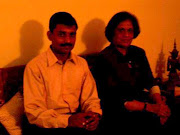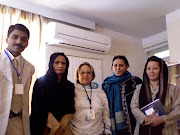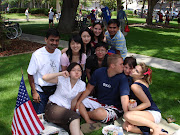Wednesday, August 15, 2007
Friday, August 10, 2007
Hansen Fellowship Report (submitted by me)
The way a society is organized can create both the root causes of conflict and the conditions in which it's likely to occur. Indeed, conflicts of all kinds most frequently arise when people feel threatened - regardless of whether the threat is real. It is harder to soothe and reassure people when they are frightened or angry. My understanding of conflict situation stems from the fact that almost all the South Asian countries are facing with.
The case of Bangladesh suggests to me that conflicts arise when people are competing for the same resources (such as territory, natural resources, jobs and income, housing) when they aren't fairly distributed or when there aren't enough to go round.
The case of Pakistan and Nepal suggests to me that conflicts arise when the people are unhappy with how they are governed. The most common conflicts occur when a particular group wants to be independent from a central government, or when their viewpoint isn't represented in the government, or when the government oppresses them and doesn't respect or meet their basic needs.
The case of Sri Lanka suggests to me that ethnic differences can cause conflict, or be made to cause it. Again, people's ethnicity gives them a sense of identity and belonging, and it is threats to this sense, which can cause violent responses, just as individuals may lash out with angry words or gestures when they feel threatened.
The case of India suggests to me that conflicts arise when people's beliefs clash. Religious and political views are particularly sensitive, because people often depend on these for a sense of identity and belonging. Sometimes a religious/political group being attacked causes the conflict; sometimes it is because the group is eager to spread a particular belief and even enforce it on others. Some leaders may aggravate religious and political differences as part of their tactics for keeping or gaining power.
Since the tragedy of India's partition, maintaining peace and harmony amongst India's diverse communities has often been a very tall order. Hardest of all has been the task of managing hostilities between Hindu and Muslim communities, and preventing the outbreaks of religious vendetta that shatter the lives of the unfortunate victims. The articulation of the two-nation theory and the creation of the state of Pakistan implied that so great was the animus between the two communities that it was virtually impossible for them to live together in peace in the same nation.
In contrast, for those concerned with the task of achieving peace in the Indian subcontinent, Hindu-Muslim unity has always been one of the essential pillars of progressive movement. The proxy-war in Kashmir, where agents of terror have infiltrated into the Jammu and Kashmir region and caused havoc for the local Indian people. Since 1990, there have been several massacres of villagers - particularly women and children. But rather than see these attacks as what they are - an assault on India's secular unity - people have begun to see these threats through the prism of religious sectarianism to destroy the peaceful lives of Hindus.
In large part, such a feeling of generalized hatred emerges from the inability to understand complex political realities. The Muslim-hating Hindu does not wish to see the subcontinent's difficulties outside the prism of Hindu-Muslim conflicts because the alternative is much more difficult to deal with. But the net effect of this within India is that the religious divide grows instead of shrinking. Rather than India uniting against it's myriad external threats, the Godhra massacre (in February 2002) caused a part of India to implode. Seething with hatred, a section of Gujarat's Hindus went on a retributive rampage - destroying homes, businesses and precious lives. Only further investigation will tell if there was any external involvement in the Godhra crime, but the reaction of Gujarat's militant Hindus has led to tremendous insecurity amongst India's Muslims and greatly weakened India's ability to act with resoluteness in the face of external threats. To that extent, it highlights serious weaknesses in the world-view of such Hindu-identified layers of Indian society. Communal clashes rarely happen out of the blue; invariably they result from catalytic incidents.
The preservation of peace and harmony requires prevention at all levels - in ensuring that inflammable incidents do not occur, and the reaction to them is immediately controlled. This may mean developing relationships and alliances with Hindus who are not entirely in sympathy or agreement with them on all issues, but nevertheless wish to live and let live.
Since the state apparatus is drawn from living and breathing individuals who may harbor all manner of prejudices and false notions, much more work in raising consciousness will also be necessary. For any set of social principles to be consistently implemented through the writ of a state, they must also win the trust and adherence of broad sections of the public. It is here that the role of the "secular" intelligentsia such us “Hansen Fellows” - whether it be in the universities or in the media becomes vital, and needs to be examined more closely.
I have seen from my own experience that many people find their identity and security in their cultural/religious group and its particular point of view - so clashes between different cultural/religious groups always lead to disputes that can easily turn violent. I have pondered upon, what if people learn to understand that differing cultures/religion are not inevitably a threat to each other? If only that happens then they will learn how to manage their differences co-operatively and peacefully.
One aspect of Religion/culture is particularly important: it can create language and behavior that excludes people, creating 'us/them', 'insider/outsider' situations and using language of discrimination, intolerance and hate. If people create a society that doesn't see 'difference' and 'diversity' as problems but as valuable for social growth, many causes of conflict disappear.
Certainly most people want to live in societies in which there is healthy conflict leading to change and progress - we are an evolving species - but in which this is achieved without fighting and killing. Most people would like it to be possible for individuals, groups and cultures to live together without violent conflict, though not resisting progress and constructive changes. Most of us would prefer our systems of law and order to be reasonable and open to reform and change, and certainly not imposed on us by force. Most of us would like a world in which human rights are respected, cultural differences are seen as enriching any society, and co-operative efforts are made to deal with problems of poverty, deprivation, injustice, and abuse of power.
Peace itself is a process in which nonviolent solutions to healthy conflict are repeatedly explored and developed in a co-operative and collaborative way.
Need for a Coalition:
I believe that there aren't yet enough skilled interveners, mediators, negotiators, peace-builders at work to help groups at conflict to solve their problems. I also learnt that those who are already at work are not yet a fully co-ordinated organisation. There are many different peace-building groups, many different approaches, and many different timescales. A coherent overall network with good communications is needed so that everyone knows what everyone else is doing.
This is where the idea of Hansen Coalition comes in. A coalition is an alliance of people or groups working together for a shared purpose. Political coalitions quickly encounter problems, because every member wants to lead. But social coalitions aren't interested in power: they work for the common good of everyone.
Where there is a strong network of strong relationships, conflict is less likely to recur. It means a coalition of interveners too: members of this young and exciting profession have a lot to communicate and a lot to learn from each other, all round the world. As they do, a 'culture of peace' can begin to grow and spread, crossing all boundaries and enriching all lives.
Undoubtedly, I am planning to utilize the coalition to find solutions to our perennial problems such as religious conflicts. I want my country to remain as a nation where respect for pluralism, for differences, for social variety is respected. No community should feel unsafe or unwanted. India does not belong to any single group of Indians, least of all to any group of religious extremists. It belongs to a mosaic of linguistically and culturally varied communities. As a Hansen Fellow I will leave no stone unturned in turning the fragile unity of India into something deeper and more enduring. There is an urgent need to create an environment where Indians can fight for a common good - for an inclusive vision that transcends religious frictions and divisions - that holds great promise for the vast majority.
The case of Bangladesh suggests to me that conflicts arise when people are competing for the same resources (such as territory, natural resources, jobs and income, housing) when they aren't fairly distributed or when there aren't enough to go round.
The case of Pakistan and Nepal suggests to me that conflicts arise when the people are unhappy with how they are governed. The most common conflicts occur when a particular group wants to be independent from a central government, or when their viewpoint isn't represented in the government, or when the government oppresses them and doesn't respect or meet their basic needs.
The case of Sri Lanka suggests to me that ethnic differences can cause conflict, or be made to cause it. Again, people's ethnicity gives them a sense of identity and belonging, and it is threats to this sense, which can cause violent responses, just as individuals may lash out with angry words or gestures when they feel threatened.
The case of India suggests to me that conflicts arise when people's beliefs clash. Religious and political views are particularly sensitive, because people often depend on these for a sense of identity and belonging. Sometimes a religious/political group being attacked causes the conflict; sometimes it is because the group is eager to spread a particular belief and even enforce it on others. Some leaders may aggravate religious and political differences as part of their tactics for keeping or gaining power.
Since the tragedy of India's partition, maintaining peace and harmony amongst India's diverse communities has often been a very tall order. Hardest of all has been the task of managing hostilities between Hindu and Muslim communities, and preventing the outbreaks of religious vendetta that shatter the lives of the unfortunate victims. The articulation of the two-nation theory and the creation of the state of Pakistan implied that so great was the animus between the two communities that it was virtually impossible for them to live together in peace in the same nation.
In contrast, for those concerned with the task of achieving peace in the Indian subcontinent, Hindu-Muslim unity has always been one of the essential pillars of progressive movement. The proxy-war in Kashmir, where agents of terror have infiltrated into the Jammu and Kashmir region and caused havoc for the local Indian people. Since 1990, there have been several massacres of villagers - particularly women and children. But rather than see these attacks as what they are - an assault on India's secular unity - people have begun to see these threats through the prism of religious sectarianism to destroy the peaceful lives of Hindus.
In large part, such a feeling of generalized hatred emerges from the inability to understand complex political realities. The Muslim-hating Hindu does not wish to see the subcontinent's difficulties outside the prism of Hindu-Muslim conflicts because the alternative is much more difficult to deal with. But the net effect of this within India is that the religious divide grows instead of shrinking. Rather than India uniting against it's myriad external threats, the Godhra massacre (in February 2002) caused a part of India to implode. Seething with hatred, a section of Gujarat's Hindus went on a retributive rampage - destroying homes, businesses and precious lives. Only further investigation will tell if there was any external involvement in the Godhra crime, but the reaction of Gujarat's militant Hindus has led to tremendous insecurity amongst India's Muslims and greatly weakened India's ability to act with resoluteness in the face of external threats. To that extent, it highlights serious weaknesses in the world-view of such Hindu-identified layers of Indian society. Communal clashes rarely happen out of the blue; invariably they result from catalytic incidents.
The preservation of peace and harmony requires prevention at all levels - in ensuring that inflammable incidents do not occur, and the reaction to them is immediately controlled. This may mean developing relationships and alliances with Hindus who are not entirely in sympathy or agreement with them on all issues, but nevertheless wish to live and let live.
Since the state apparatus is drawn from living and breathing individuals who may harbor all manner of prejudices and false notions, much more work in raising consciousness will also be necessary. For any set of social principles to be consistently implemented through the writ of a state, they must also win the trust and adherence of broad sections of the public. It is here that the role of the "secular" intelligentsia such us “Hansen Fellows” - whether it be in the universities or in the media becomes vital, and needs to be examined more closely.
I have seen from my own experience that many people find their identity and security in their cultural/religious group and its particular point of view - so clashes between different cultural/religious groups always lead to disputes that can easily turn violent. I have pondered upon, what if people learn to understand that differing cultures/religion are not inevitably a threat to each other? If only that happens then they will learn how to manage their differences co-operatively and peacefully.
One aspect of Religion/culture is particularly important: it can create language and behavior that excludes people, creating 'us/them', 'insider/outsider' situations and using language of discrimination, intolerance and hate. If people create a society that doesn't see 'difference' and 'diversity' as problems but as valuable for social growth, many causes of conflict disappear.
Certainly most people want to live in societies in which there is healthy conflict leading to change and progress - we are an evolving species - but in which this is achieved without fighting and killing. Most people would like it to be possible for individuals, groups and cultures to live together without violent conflict, though not resisting progress and constructive changes. Most of us would prefer our systems of law and order to be reasonable and open to reform and change, and certainly not imposed on us by force. Most of us would like a world in which human rights are respected, cultural differences are seen as enriching any society, and co-operative efforts are made to deal with problems of poverty, deprivation, injustice, and abuse of power.
Peace itself is a process in which nonviolent solutions to healthy conflict are repeatedly explored and developed in a co-operative and collaborative way.
Need for a Coalition:
I believe that there aren't yet enough skilled interveners, mediators, negotiators, peace-builders at work to help groups at conflict to solve their problems. I also learnt that those who are already at work are not yet a fully co-ordinated organisation. There are many different peace-building groups, many different approaches, and many different timescales. A coherent overall network with good communications is needed so that everyone knows what everyone else is doing.
This is where the idea of Hansen Coalition comes in. A coalition is an alliance of people or groups working together for a shared purpose. Political coalitions quickly encounter problems, because every member wants to lead. But social coalitions aren't interested in power: they work for the common good of everyone.
Where there is a strong network of strong relationships, conflict is less likely to recur. It means a coalition of interveners too: members of this young and exciting profession have a lot to communicate and a lot to learn from each other, all round the world. As they do, a 'culture of peace' can begin to grow and spread, crossing all boundaries and enriching all lives.
Undoubtedly, I am planning to utilize the coalition to find solutions to our perennial problems such as religious conflicts. I want my country to remain as a nation where respect for pluralism, for differences, for social variety is respected. No community should feel unsafe or unwanted. India does not belong to any single group of Indians, least of all to any group of religious extremists. It belongs to a mosaic of linguistically and culturally varied communities. As a Hansen Fellow I will leave no stone unturned in turning the fragile unity of India into something deeper and more enduring. There is an urgent need to create an environment where Indians can fight for a common good - for an inclusive vision that transcends religious frictions and divisions - that holds great promise for the vast majority.
Subscribe to:
Comments (Atom)











